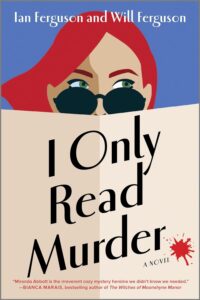Spenser’s Boston, Temperance Brennan’s North Carolina, Dave Robicheaux’s New Iberia…real places with fictional detectives. The setting is an important part of any series of books and is often informed by a deep connection the author has with the location they have chosen.
Robert B. Parker spent his whole life living and writing in Boston. Kathy Reichs, like her protagonist, is a forensic investigator based out of Charlotte who also worked in Quebec, both locations brought vividly to life in her novels, and James Lee Burke sets the majority of his work in his hometown, except when he occasionally detours to place a mystery in Montana.
When we were coming up with the character of Miranda Abbott, we knew she had to start off in Los Angeles. Or Hollywood, to be precise. What better location for someone who was once the star of a network television series playing the crime-solving, karate chopping, bikini-wearing Pastor Fran in Pastor Fran Investigates, a show we like to think of as a cross between Murder She Wrote, Father Brown, and Charlie’s Angels.
Of course, it’s been 15 years since Miranda’s series was unceremoniously cancelled, she’s living in what Armand Gamache (as written by Louise Penny) would refer to as “reduced circumstances,” and she’s blissfully unaware that she’s no longer famous. Miranda gets turned down for a role on the reality series The Real Has-Beens of Beverly Hills, her agent fires her, and she gets evicted from her run-down apartment. Just when things seem dire to the point of catastrophe, a mysterious postcard arrives, summoning her to…well, where exactly?
We wanted Miranda to be a fish out of water, wherever we sent her, and we knew that we wanted her new location to be a permanent relocation, and the setting of the series.
We do not live in the same city. One of us (that would be Will) lives in Calgary, a modern metropolis of over a million people, and the other one (that would be Ian) lives in Victoria on Vancouver Island, which could – if you stretched the point – be described as “an exotic town on an island in the Pacific Ocean,” but is certainly no Montego Bay, which already has Raythan Preddy and Sean Harris wandering around solving crimes. So, no point in using a location we were familiar with as the setting.
We also wanted a small town, but not too small, with the ability to bring in characters from other locations just to keep the local body count to a manageable number. We decided on a west coast location and thought Oregon would work best. Portland, possibly? Too large. And Joe Burgess has that town covered. Maybe Ashland? Too small. And we don’t know much about Ashland, other than what we could glean from the Jules Capshaw mysteries, and the one time one of us (Ian) attended their Shakespeare festival.
We decided to make up our location. A fictional place with a fictional detective. We wanted a town that was not too big, not too small, but just the right size. We thought about calling it Goldilocks, briefly, but common sense prevailed, and instead we invented Happy Rock, Oregon, which is a fictitious town, indeed, but which is located on the very real Tillamook Bay. Look it up. Happy Rock is like Ed McBain’s gritty Isola, or the Hardy Boys fictional Bayport, or the idyllic Cabot Cove, which is also completely imaginary, a fact one of us (Will) was completely surprised by.
The best part of creating a completely imaginary made-up location for the Miranda Abbott mysteries? Freedom. Glorious, glorious freedom. We can do anything we want. If we want Happy Rock to have a historic Opera House, done. Do we need a stately hotel? Boom. How about a lighthouse? Why not? We’re only limited by our imaginations and the requirements of the story. We created a town with a handful of businesses sprinkled along a small coastline. A three-person police force. A weekly newspaper. Everything we might need.
The worst part of creating a completely imaginary made-up location? Also freedom. Horrible, horrible freedom. We must, from book to book, keep the geography and layout of the town consistent. If Happy Rock was, you know, a real community, although it certainly feels real enough to us, we’d probably have to deal with the odd reader correcting or contradicting us. “You can’t actually make a left turn out of the entrance to the Duchess Hotel,” “The Cozy Diner doesn’t actually share a parking lot with Tanvir’s Bait & Hardware,” “Actually the Opera House actually faces to the southeast.” We just assume they would overuse the word “actually.” Since Happy Rock isn’t a real place, and we can’t consult a map or look for information about it online, we have to make sure a reader doesn’t point out “in the previous book Harpreet’s store wasn’t across the street from the bookstore.” This reader wouldn’t use “actually,” of course, but they’d be right, dammit.
So, we not only write the books, but we also have to read them. Writing the Miranda Abbott mysteries is a lot of fun. We’ve just finished the first draft of the third book in the series, and as long as readers keep enjoying them, we’re going to keep writing them. However, before a manuscript gets to be a book, we’ve read it edited, copy edited, line edited…we’ve reviewed the typeset and advanced reader copies, listened to the audio version…frankly by the time it hits the bookstore it’s not quite as much fun for us to read. Besides, we already know who the killer is.
The best thing about Happy Rock? Location, location, location. Happy Rock is just far enough off the beaten track to be isolated but not so much that we can’t bring in outsiders or tourist or, most importantly, victims and/or suspects. When we finished the first Miranda Abott mystery, we realized that a few of the characters we created would not be able to appear in subsequent novels. Someone revealed as a murderer would be noticeable by their absence in a later book, and a character who is a suspect in one shouldn’t probably appear in another book since some readers have the annoying habit of reading books in a series out of order.
However, as long as we’re careful in our writing (and our reading) we’ll be able to keep Happy Rock as real as possible. No matter what order you read the books in.
*


















